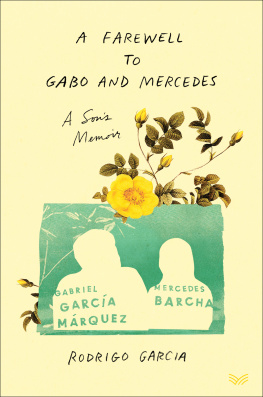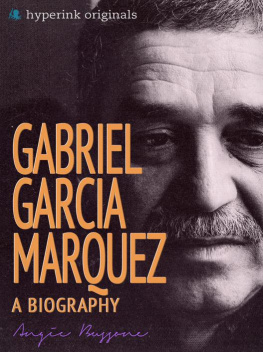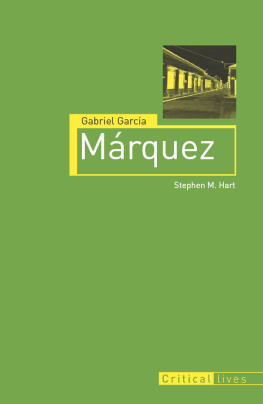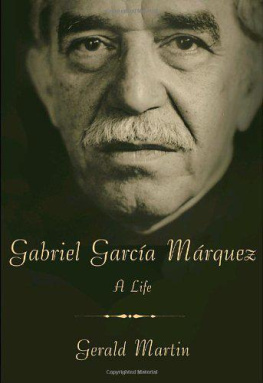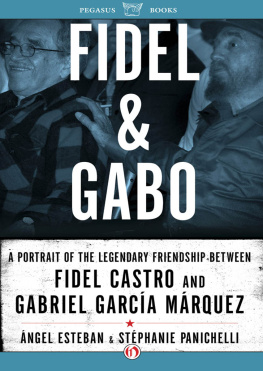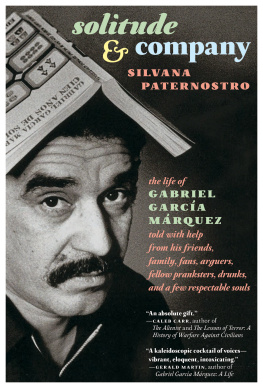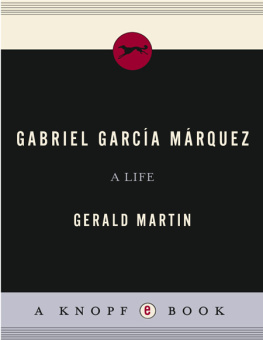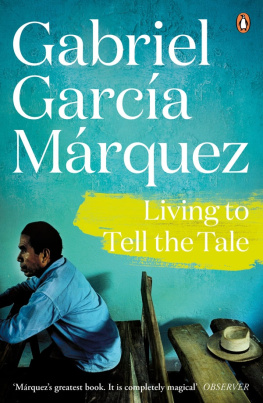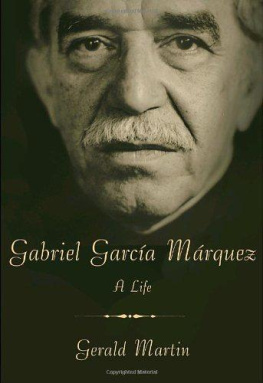Contents
Guide
A FAREWELL TO GABO AND MERCEDES . Copyright 2021 by Rodrigo Garcia. All rights reserved under International and Pan-American Copyright Conventions. By payment of the required fees, you have been granted the nonexclusive, nontransferable right to access and read the text of this e-book on-screen. No part of this text may be reproduced, transmitted, downloaded, decompiled, reverse-engineered, or stored in or introduced into any information storage and retrieval system, in any form or by any means, whether electronic or mechanical, now known or hereafter invented, without the express written permission of HarperCollins e-books.
Grateful acknowledgment is made to the following for permission to reprint from previously published material:
Gabriel Garca Mrquez, One Hundred Years of Solitude. Translated by Gregory Rabassa. English translation copyright 1970 by Harper & Row Publishers, Inc. Reprinted by permission of HarperCollins Publishers.
Gabriel Garca Mrquez, The Autumn of the Patriarch. Translated by Gregory Rabassa. English translation copyright 1976 Harper & Row Publishers, Inc. Reprinted by permission of HarperCollins Publishers.
Gabriel Garca Mrquez, Love in the Time of Cholera. Translated by Edith Grossman. English translation copyright 1988 by Vintage Books, a division of Random House, Inc. Reprinted by permission of Penguin Random House.
Gabriel Garca Mrquez, The General in His Labyrinth. Translated by Edith Grossman. English translation copyright 1990 by Alfred A. Knopf, a division of Random House, Inc. Reprinted by permission of Penguin Random House.
Cover design: Alicia Tatone
Cover image (flowers): Getty Images / NSA Digital Archive
FIRST HARPERVIA EDITION PUBLISHED IN 2021
Library of Congress Cataloging-in-Publication Data
Names: Garca, Rodrigo, 1959 author.
Title: A farewell to Gabo and Mercedes : a sons memoir / Rodrigo Garcia.
Description: First edition. | New York, NY : HarperVia, 2021.
Identifiers: LCCN 2021010396 | ISBN 9780063158337 (hardcover) | ISBN 9780063158313 (paperback) | ISBN 9780063158320 (ebook)
Subjects: LCSH: Garca Mrquez, Gabriel, 19272014Family. | Barcha, Mercedes. | Garca, Rodrigo, 1959 | Novelists, ColombianBiography.
Classification: LCC PQ8180.17.A73 Z664817 2021 | DDC 863/.64dc23
LC record available at https://lccn.loc.gov/2021010396
Digital Edition JULY 2021 ISBN: 978-0-06-315832-0
Version 06142021
Print ISBN: 978-0-06-315833-7
For my brother
Contents
Entonces fue al castao, pensando en el circo, y mientras orinaba trat de seguir pensando en el circo, pero ya no encontr el recuerdo. Meti la cabeza entre los hombros, como un pollito, y se qued inmvil con la frente apoyada en el tronco del castao. La familia no se enter hasta el da siguiente, a las once de la maana, cuando Santa Sofa de la Piedad fue a tirar la basura en el traspatio y le llam la atencin que estuvieran bajando los gallinazos.
Cien aos de soledad
Then he went to the chestnut tree, thinking about the circus, and while he urinated he tried to keep on thinking about the circus, but he could no longer find the memory. He pulled his head in between his shoulders like a baby chick and remained motionless with his forehead against the trunk of the chestnut tree. The family did not find him until the following day at eleven oclock in the morning when Santa Sofa de la Piedad went to throw out the garbage in back and her attention was attracted by the descending vultures.
One Hundred Years of Solitude
W hen my brother and I were children, my father made us promise to spend New Years Eve of the year 2000 with him. He reminded us of that commitment several times throughout our adolescence, and his insistence was embarrassing to me. I eventually came to interpret it as his wish to still be alive on that date. He would be seventy-two, I would be forty, the twentieth century would come to an end. Those milestones could not seem further away when I was a teen. After my brother and I became adults, the promise was seldom mentioned, but we were indeed all together the night of the new millennium in my fathers favorite city, Cartagena de Indias. We had a deal, you and I, my father said to me shyly, perhaps then also somewhat embarrassed by his insistence. Thats right, I said, and we never spoke of it again. He lived another fifteen years.
When he was in his late sixties, I asked him what he thought about at night, after he turned out the lights. I think that things are almost over. Then he added with a smile, But theres still time. No need to get too worried just yet. His optimism was genuine, not just an attempt to comfort me. You wake up one day and youre old. Just like that, with no warning. Its stunning, he added. I heard years ago that there comes a time in the life of a writer when you are no longer able to write a long work of fiction. The head can no longer hold the vast architecture or navigate the perilous crossing of a lengthy novel. Its true. I can feel it now. So it will be shorter pieces from now on.
When he was eighty, I asked him what that was like.
The view from eighty is astonishing, really. And the end is near.
Are you afraid?
It makes me immensely sad.
When I think back on these moments, I am genuinely moved by how forthcoming he was, especially given the cruelty of the questions.
I call my mother on a weekday morning in March 2014, and she tells me that my father has been in bed with a cold for two days. This is not unusual for him, but she assures me that this time its different. Hes not eating, and he wont get up. Hes not himself. Hes listless. lvaro started like this, she adds, referring to a friend of my fathers generation who died the previous year. Were not getting out of this one is her prognosis. After the call I am not alarmed, since my mothers forecast can be attributed to anxiety. She is well into a period of her life when old friends are dying with some frequency. And shes been hard hit by the recent loss of siblings, two of her youngest and dearest. Still, the call makes my imagination take flight. Is this how the end begins?
My mother, twice a cancer survivor, is due in Los Angeles for medical tests, so it is decided that my brother will fly in from Paris, where he lives, to Mexico City to be with our father. I will be with our mother in California. As soon as my brother arrives, my fathers cardiologist and principal doctor tells him that my father has pneumonia and that the team would feel much more at ease if they could hospitalize him for further tests. It appears he had been suggesting that to my mother for at least a few days but that she had been reluctant. Perhaps she was scared of what a proper physical exam would uncover.
P hone conversations with my brother over the next few days allow me to form a picture of the hospital stay. When my brother checks my father in, the administrator jumps in her seat with excitement when she hears his name. Oh, my God, the writer? Would you mind if I call my sister-in-law and tell her? She has to hear about this. He entreats her not to, and she yields, reluctantly. My father is placed in a relatively isolated room at one end of a hallway to protect his privacy, but within half a day doctors, nurses, orderlies, technicians, other patients, maintenance and cleaning personnel, and perhaps the administrators sister-in-law make their way past his door to catch a glimpse of him. The hospital responds by limiting access to the area. Journalists have also begun to gather outside the main gate of the hospital, and the news is published that he is in grave condition. Its undeniable that were being spoken to loud and clear: my fathers illness will be partly a public affair. We cannot shut the door completely because much of the curiosity about him is from concern, admiration, and affection. When my brother and I were kids, our parents invariably referred to us, accurately or not, as the most well-behaved children in the world, so that expectation must be fulfilled. We must respond to this challenge, whether we have the strength for it or not, with civility and gratitude. We will need to do that while keeping my mother satisfied that the line between the public and the private, wherever we determine it to be given the circumstances, is strictly enforced. This has always been of enormous importance to her despite, or maybe because of, her addiction to the most salacious gossip shows on television. We are not public figures, she likes to remind us. I know that I will not publish this memoir until she is unable to read it.

